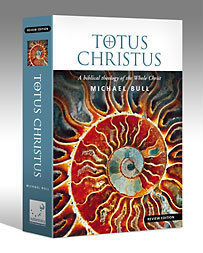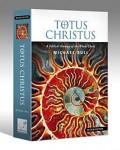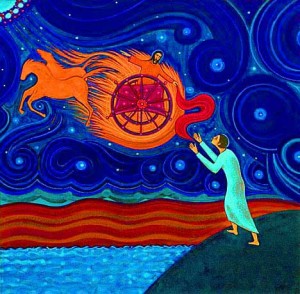Apr
10
2009
 After the altar was rebuilt and the foundation for the Temple was restored, local opposition and intimidation brought a halt to construction. God’s people compromised and there was peace, but it was the stillness of stagnant water. The Lord used two witnesses, Haggai and Zechariah, as shoulders to lift the capstone.
After the altar was rebuilt and the foundation for the Temple was restored, local opposition and intimidation brought a halt to construction. God’s people compromised and there was peace, but it was the stillness of stagnant water. The Lord used two witnesses, Haggai and Zechariah, as shoulders to lift the capstone.
Haggai dealt with the practical consequences of the people’s failure to complete the Temple. No matter how hard they worked, the Lord made sure their pockets had holes. Without making the house of God a priority they could not prosper. Haggai also encouraged them with promises, which included a prediction that the Lord would soon shake the nations and bring their riches to Judah. James Jordan pictures this as the Lord holding a man upside down and shaking all the money out of his pockets.
Yet now be strong, O Zerubbabel, declares the Lord. Be strong, O Joshua, son of Jehozadak, the high priest. Be strong, all you people of the land, declares the Lord. Work, for I am with you, declares the Lord of hosts, according to the covenant that I made with you when you came out of Egypt. My Spirit remains in your midst. Fear not. For thus says the Lord of hosts: Yet once more, in a little while, I will shake the heavens and the earth and the sea and the dry land. And I will shake all nations, so that the treasures of all nations shall come in, and I will fill this house with glory, says the Lord of hosts… (Haggai 2:4-7)
The fulfilment of this is recorded in the book of Esther. The author of Hebrews understood the pattern. He quoted Haggai before the next great plunder of the Lord’s enemies (Hebrews 12:26), but in that day the plunder, and the house, would be spiritual and eternal.
Comments Off | tags: Haggai, James Jordan, Zechariah | posted in The Restoration Era, Totus Christus
Apr
10
2009
 Nebuchadnezzar fought hard against historical Tyre, but was not able to plunder it. Was Ezekiel wrong? Or does Ezekiel’s prediction of Tyre’s total destruction support the identification of the subject of this prophesy as Judah? It was Judah whose (bronze) pillars were brought down and her foundations made a bare rock. The Lord would instead pay his faithful Babylonian “servant” with the riches of Egypt (29:19-20).
Nebuchadnezzar fought hard against historical Tyre, but was not able to plunder it. Was Ezekiel wrong? Or does Ezekiel’s prediction of Tyre’s total destruction support the identification of the subject of this prophesy as Judah? It was Judah whose (bronze) pillars were brought down and her foundations made a bare rock. The Lord would instead pay his faithful Babylonian “servant” with the riches of Egypt (29:19-20).
The imagery of Pharaoh’s descent to Sheol in chapter 32 has the Exodus in mind. Egypt’s armies would be swallowed by Babylon in the way Pharaoh’s armies drowned in the Red Sea. All the uncircumcised nations would welcome him to hell, and Egypt is the last army to be drowned and made unable to cross over into the new world the Lord was creating.
Of the imagery reprised in Revelation, the foremost is that of a dragon of the Nile, most likely a crocodile. Pharaoh thought he was secure in the fertility of the river, but the Lord would put hooks in his jaws and throw him into the wilderness. The crocodile would be food for birds and beasts, a Covenant curse. Ezekiel is once again making a veiled insult against the king of Israel, using Pharaoh’s behaviour as an object lesson. Israel’s mission was to bring the river of life to the nations but she had instead brought them harm. Like the real Egypt, the nations had leaned on Israel as a crutch, and she had only brought them injury. For this, Egypt/Israel would be made desolate, then restored from captivity. But because she had usurped the Lord’s throne, she would forever be a vassal kingdom.
As Tyre, Solomon’s gold was stolen by foreigners. As Sidon, his oppressive taxation was cut off. And as Egypt, his many wives were taken captive and the horses he had imported from Egypt were finally drowned in the sea. The word of the Lord is sure.
Comments Off | tags: Babylon, Ezekiel, Nebuchadnezzar, Pharaoh, Revelation, Tyre | posted in Biblical Theology, Totus Christus
Apr
8
2009
The golden Lampstand, with seven flames, corresponds to the sun, moon and five planets (those visible to the naked eye) that govern the firmament. These are the seven “eagle-eyes” of God. The Lampstand was a stylised almond tree. In Hebrew, the word translated “almond” is also the word for “watcher, overseer.” An almond tree is a shepherd who grows out of the earth and reaches heaven–a Tree of Life.
Stephen defended himself with a speech recounting the history of Israel, culminating in their murder of prophets before the exile.
“You stiff-necked people, uncircumcised in heart and ears, you always resist the Holy Spirit. As your fathers did, so do you. Which of the prophets did your fathers not persecute? And they killed those who announced beforehand the coming of the Righteous One, whom you have now betrayed and murdered, you who received the law as delivered by angels and did not keep it.” (Acts 7:51-53)
 They would be exiled, like their fathers, but into outer darkness grinding their teeth in agony (Matthew 8:12). They were already grinding their teeth, but against Stephen. He saw the heavenly veil opened and Jesus standing at the right hand of God, the Watcher Tree, the Lampstand, measuring the first martyr of the New Covenant Table of Showbread. Like Jesus, Stephen was ejected from the city and executed. Like Jesus, he asked the Lord to receive his spirit, and prayed for forgiveness for his murderers. He was “one like the Son of Man.”
They would be exiled, like their fathers, but into outer darkness grinding their teeth in agony (Matthew 8:12). They were already grinding their teeth, but against Stephen. He saw the heavenly veil opened and Jesus standing at the right hand of God, the Watcher Tree, the Lampstand, measuring the first martyr of the New Covenant Table of Showbread. Like Jesus, Stephen was ejected from the city and executed. Like Jesus, he asked the Lord to receive his spirit, and prayed for forgiveness for his murderers. He was “one like the Son of Man.”
Continue reading
Comments Off | tags: Elijah, Lampstand, Stephen | posted in Biblical Theology, Totus Christus
Apr
8
2009
“Even if Noah, Daniel, and Job were living in that nation, their faithfulness would not save anyone but themselves. …even if Noah, Daniel, and Job were living there, I, the Lord, promise that the children of these faithful men would also die. Only the three of them would be spared.” (Ezekiel 14:14, 20)
 The mediation of even the holiest men would not avert God’s judgments. Noah had failed to prevent the destruction of the old world. Daniel had failed to prevent the destruction of the Land. Job had failed to prevent the destruction of his children. Like the three domains under these men, Jerusalem was beyond deliverance. And even if these holy watchmen were present in Jerusalem, they alone would be saved. These three only would be rescued from Sodom like Lot. In chapter 23, Ezekiel refers to Jerusalem as Sodom. Jerusalem the oppressor was also like Egypt. As the Land symbolically had four corners, four judgments would desolate it: sword, famine, beasts and pestilence, the Covenant curses from Leviticus 26. This was the Levitical sword indeed. The exiles, as watchmen, would see the repentance of the “marked” survivors and know that the Lord had not acted without cause.
The mediation of even the holiest men would not avert God’s judgments. Noah had failed to prevent the destruction of the old world. Daniel had failed to prevent the destruction of the Land. Job had failed to prevent the destruction of his children. Like the three domains under these men, Jerusalem was beyond deliverance. And even if these holy watchmen were present in Jerusalem, they alone would be saved. These three only would be rescued from Sodom like Lot. In chapter 23, Ezekiel refers to Jerusalem as Sodom. Jerusalem the oppressor was also like Egypt. As the Land symbolically had four corners, four judgments would desolate it: sword, famine, beasts and pestilence, the Covenant curses from Leviticus 26. This was the Levitical sword indeed. The exiles, as watchmen, would see the repentance of the “marked” survivors and know that the Lord had not acted without cause.
Comments Off | tags: Daniel, Egypt, Ezekiel, Job, Noah, Sodom | posted in Biblical Theology, Totus Christus
Apr
8
2009
 They sent therefore fifty men. And for three days they sought [Elijah] but did not find him. And they came back to [Elisha] while he was staying at Jericho, and he said to them, “Did I not say to you, ‘Do not go’?” (2 Kings 2:17-18)
They sent therefore fifty men. And for three days they sought [Elijah] but did not find him. And they came back to [Elisha] while he was staying at Jericho, and he said to them, “Did I not say to you, ‘Do not go’?” (2 Kings 2:17-18)
It seems the Ark was “taken” like Enoch. If it was carried to Babylon, perhaps it was melted down with other conquered “gods” to contribute to Nebuchadnezzar’s “golden calf.” It fits the pattern if the Ark “died” on the altar of false worship “outside the city.” Continue reading
Comments Off | tags: Ark of the Covenant, Babylon, Daniel, Elijah, Elisha, Enoch, Jericho, Jezebel, Lampstand, Michael O'Brien, Nebuchadnezzar, Revelation, Zechariah | posted in Biblical Theology, The Restoration Era, Totus Christus
 After the altar was rebuilt and the foundation for the Temple was restored, local opposition and intimidation brought a halt to construction. God’s people compromised and there was peace, but it was the stillness of stagnant water. The Lord used two witnesses, Haggai and Zechariah, as shoulders to lift the capstone.
After the altar was rebuilt and the foundation for the Temple was restored, local opposition and intimidation brought a halt to construction. God’s people compromised and there was peace, but it was the stillness of stagnant water. The Lord used two witnesses, Haggai and Zechariah, as shoulders to lift the capstone.


























